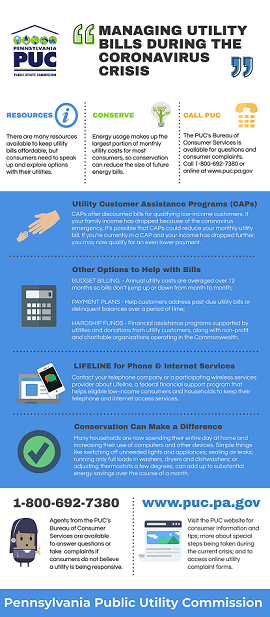
“A major focus right now is to help consumers understand that there are many resources available to keep their utility bills affordable, but they need to speak up,” said PUC Chairman Gladys Dutrieuille.
“We now have households across the state who may never have needed assistance before – but suddenly they’ve had their work hours reduced, or they’re not working at all, and now they’re struggling.
“We urge consumers to talk with the utilities now about the challenges they are facing so they can work together in exploring available options before households are faced with overdue bills and past-due balances.
“Ignoring those bills won’t make them go away, but the uncertainty will add to family stress during this very difficult time.”
Utility Customer Assistance Programs
Every major electric and natural gas utility overseen by the PUC offers Customer Assistance Programs (CAPs), under which qualifying low-income customers pay discounted bills.
Qualification in CAP programs is based on household size and gross household income.
“If you’ve had a recent reduction in family income because of the coronavirus emergency, it’s possible that you now qualify for CAP to help reduce your monthly utility bill – even if you’ve never been part of a CAP program before,” noted Dutrieuille.
“Also, if you’re currently on a CAP – and your income has dropped further – you may now qualify for an even lower payment.”
Dutrieuille added that utilities also have a variety of other options to help consumers, including:
- “Budget billing” – which takes a customer’s annual utility costs and averages them out over 12 months so that bills don’t jump up or down from month to month;
- “Payment plans” to help address past-due bills or delinquent balances over a period of time;
- Various “hardship funds” supported by utilities and donations from utility customers along with non-profit and charitable organizations operating in the Commonwealth; and
- “Lifeline service” – contact your telephone company or a participating wireless services provider about Lifeline, a federal financial support program that helps eligible low-income consumers and households to keep their telephone and internet access. More information on Lifeline is available at www.lifelinesupport.org. You can also call Lifeline at 1-800-234-9473 between 9 a.m. to 9 p.m., seven days a week.
Additionally, the Low-Income Home Energy Assistance Program (LIHEAP) may also have funds available to help eligible customers, providing financial assistance with heating-related utilities and crisis funding to address emergency situations.
Consumers are urged to call their utility to inquire about such programs.
Energy Conservation Saves Money
The PUC also encourages families to explore energy conservation as a way to help manage bills, especially as more people are working remotely.
The spring and fall are typically lower-usage times of the year, but many households are now spending their entire day at home and increasing their use of computers and other devices, the commission noted.
“Since energy usage makes up the largest portion of monthly utility costs for most consumers, this shift to ‘work at home’ and ‘school at home’ could have a notable impact on future monthly bills.”
The PUC has interactive information and tips for saving energy on its energy shopping Web sites – PAPowerSwitch.com and PAGasSwitch.com – to help identify ways to save on energy usage.
Simple things like switching off unneeded lights and appliances; sealing air leaks; running only full loads in washers, dryers and dishwashers; or adjusting thermostats a few degrees, can add up to substantial energy savings over the course of a month, the PUC explained.
“And, reduced usage helps curtail possible strains on our electric grid and energy infrastructure.”
Reach the PUC by Phone or Online
Even with the current moratorium on payment-related terminations for utility services under the PUC’s jurisdiction, consumers with questions or complaints about terminations and other utility financial issues may still need to reach the Commission.
If questions remain after talking with their utility, consumers may call the PUC’s Bureau of Consumer Services (BCS) toll-free at 1-800-692-7380, or submit an electronic complaint form.
The BCS system is operational and continuing to take calls and respond to consumer complaints, but because of the current state office building closure the PUC cannot currently access items sent by mail.
All consumer inquiries should be directed to the toll-free hotline or online complaint system.